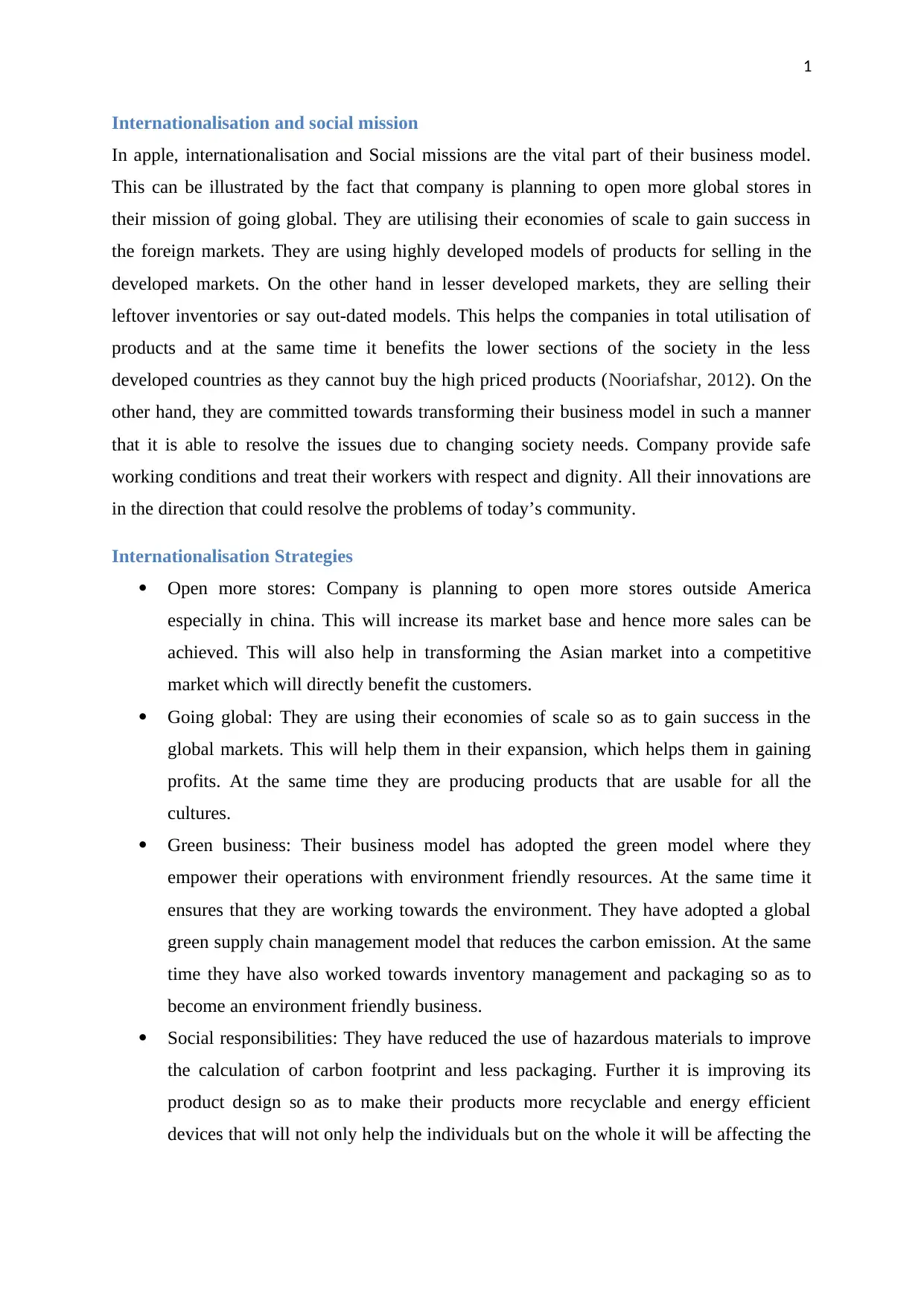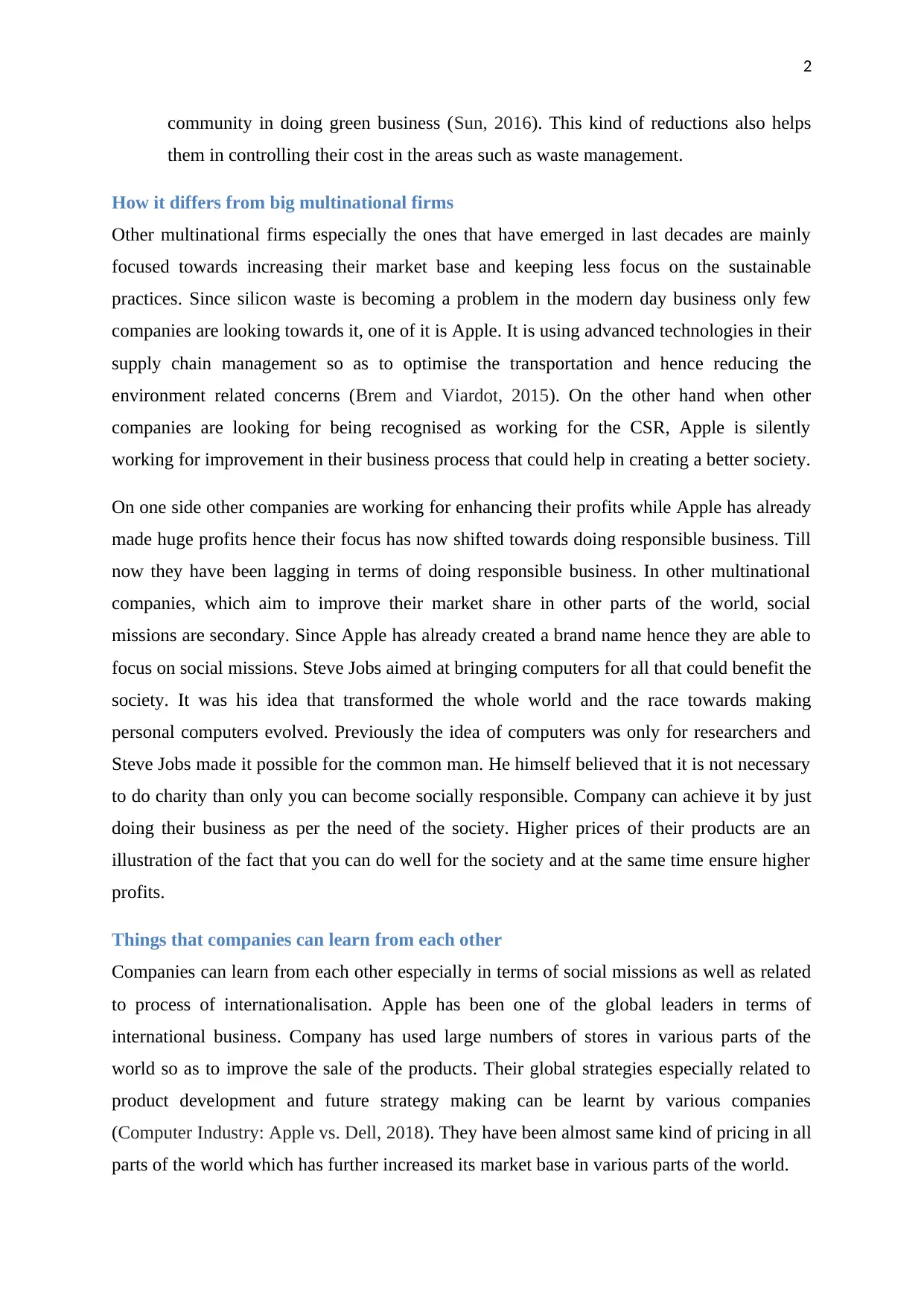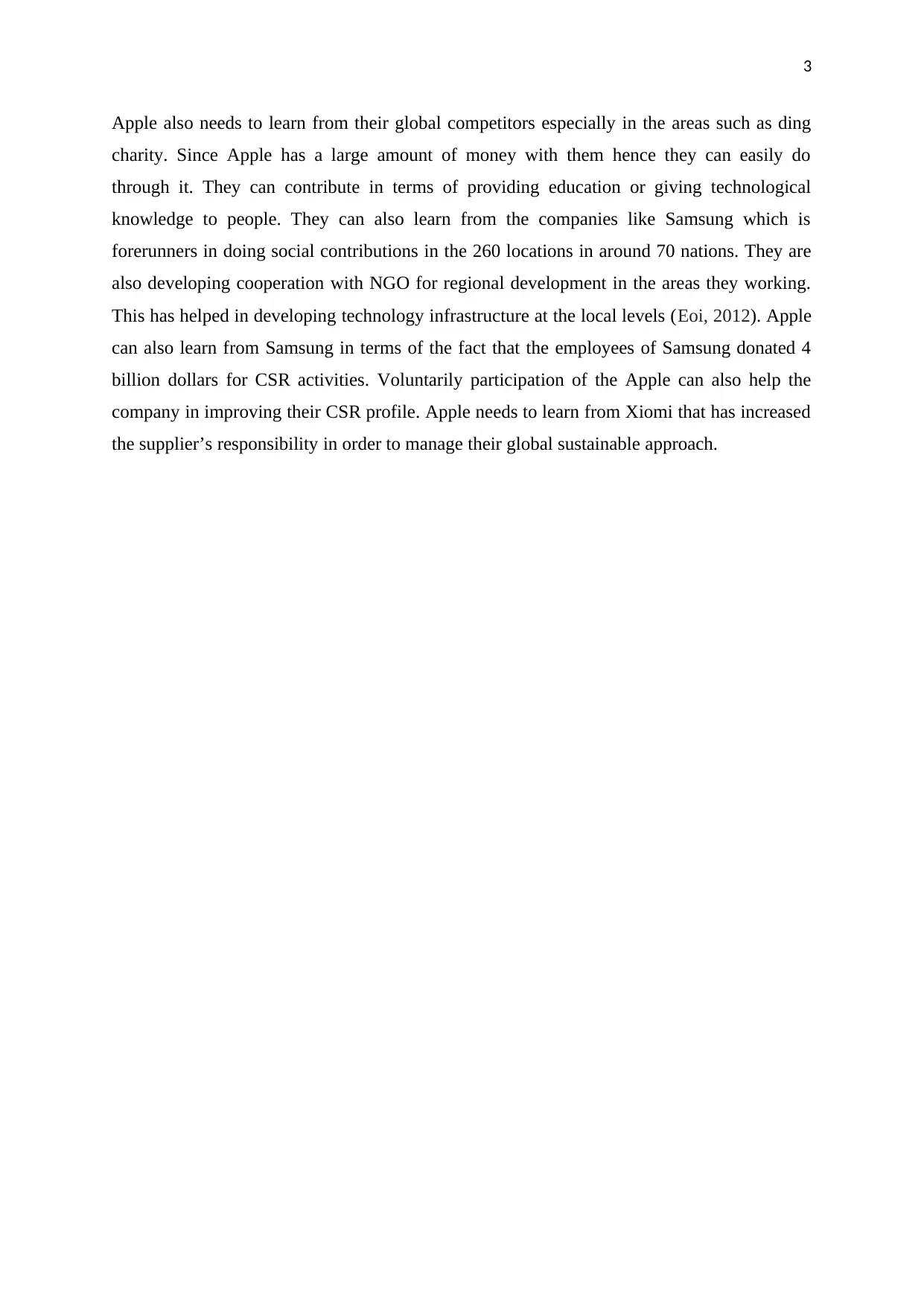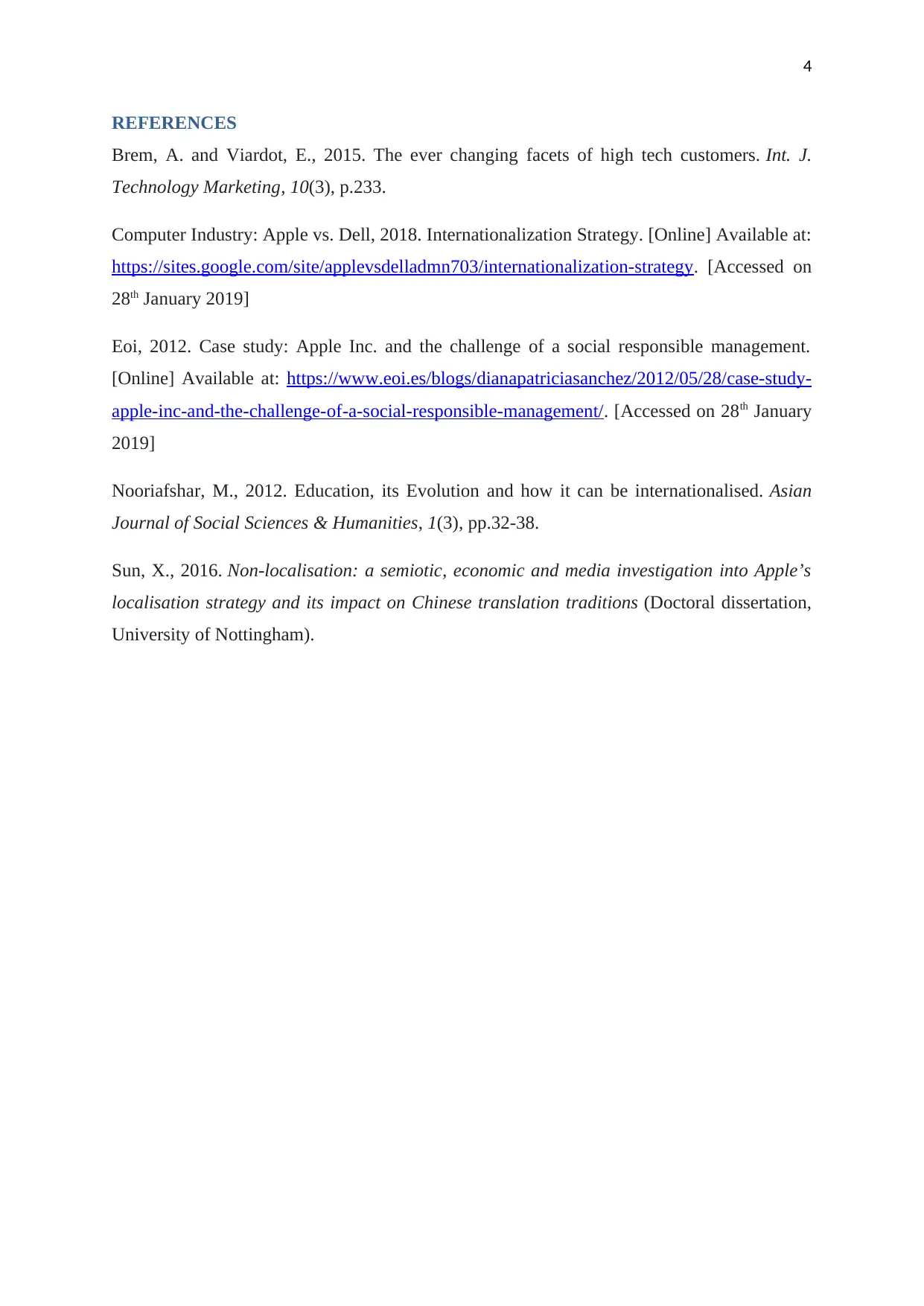Apple's Internationalization Strategy and its Social Mission Impact
VerifiedAdded on 2023/04/25
|5
|1263
|474
Essay
AI Summary
This essay examines Apple's internationalization strategies and its commitment to social missions, highlighting the company's approach to global expansion while addressing societal needs. Apple aims to increase its global presence by opening more stores, particularly in Asia, and leveraging economies of scale. The company also focuses on green business practices, including environmentally friendly operations, a global green supply chain, and reduced carbon emissions. Unlike some multinational firms primarily focused on market share and profit, Apple emphasizes sustainable practices and social responsibility, integrating these values into its business processes. The essay further suggests that Apple could enhance its CSR profile by engaging in more philanthropic activities, drawing lessons from companies like Samsung and Xiaomi. Desklib provides a platform for students to access this essay and other valuable study resources.

MANAGEMENT
Paraphrase This Document
Need a fresh take? Get an instant paraphrase of this document with our AI Paraphraser

1
Internationalisation and social mission
In apple, internationalisation and Social missions are the vital part of their business model.
This can be illustrated by the fact that company is planning to open more global stores in
their mission of going global. They are utilising their economies of scale to gain success in
the foreign markets. They are using highly developed models of products for selling in the
developed markets. On the other hand in lesser developed markets, they are selling their
leftover inventories or say out-dated models. This helps the companies in total utilisation of
products and at the same time it benefits the lower sections of the society in the less
developed countries as they cannot buy the high priced products (Nooriafshar, 2012). On the
other hand, they are committed towards transforming their business model in such a manner
that it is able to resolve the issues due to changing society needs. Company provide safe
working conditions and treat their workers with respect and dignity. All their innovations are
in the direction that could resolve the problems of today’s community.
Internationalisation Strategies
Open more stores: Company is planning to open more stores outside America
especially in china. This will increase its market base and hence more sales can be
achieved. This will also help in transforming the Asian market into a competitive
market which will directly benefit the customers.
Going global: They are using their economies of scale so as to gain success in the
global markets. This will help them in their expansion, which helps them in gaining
profits. At the same time they are producing products that are usable for all the
cultures.
Green business: Their business model has adopted the green model where they
empower their operations with environment friendly resources. At the same time it
ensures that they are working towards the environment. They have adopted a global
green supply chain management model that reduces the carbon emission. At the same
time they have also worked towards inventory management and packaging so as to
become an environment friendly business.
Social responsibilities: They have reduced the use of hazardous materials to improve
the calculation of carbon footprint and less packaging. Further it is improving its
product design so as to make their products more recyclable and energy efficient
devices that will not only help the individuals but on the whole it will be affecting the
Internationalisation and social mission
In apple, internationalisation and Social missions are the vital part of their business model.
This can be illustrated by the fact that company is planning to open more global stores in
their mission of going global. They are utilising their economies of scale to gain success in
the foreign markets. They are using highly developed models of products for selling in the
developed markets. On the other hand in lesser developed markets, they are selling their
leftover inventories or say out-dated models. This helps the companies in total utilisation of
products and at the same time it benefits the lower sections of the society in the less
developed countries as they cannot buy the high priced products (Nooriafshar, 2012). On the
other hand, they are committed towards transforming their business model in such a manner
that it is able to resolve the issues due to changing society needs. Company provide safe
working conditions and treat their workers with respect and dignity. All their innovations are
in the direction that could resolve the problems of today’s community.
Internationalisation Strategies
Open more stores: Company is planning to open more stores outside America
especially in china. This will increase its market base and hence more sales can be
achieved. This will also help in transforming the Asian market into a competitive
market which will directly benefit the customers.
Going global: They are using their economies of scale so as to gain success in the
global markets. This will help them in their expansion, which helps them in gaining
profits. At the same time they are producing products that are usable for all the
cultures.
Green business: Their business model has adopted the green model where they
empower their operations with environment friendly resources. At the same time it
ensures that they are working towards the environment. They have adopted a global
green supply chain management model that reduces the carbon emission. At the same
time they have also worked towards inventory management and packaging so as to
become an environment friendly business.
Social responsibilities: They have reduced the use of hazardous materials to improve
the calculation of carbon footprint and less packaging. Further it is improving its
product design so as to make their products more recyclable and energy efficient
devices that will not only help the individuals but on the whole it will be affecting the

2
community in doing green business (Sun, 2016). This kind of reductions also helps
them in controlling their cost in the areas such as waste management.
How it differs from big multinational firms
Other multinational firms especially the ones that have emerged in last decades are mainly
focused towards increasing their market base and keeping less focus on the sustainable
practices. Since silicon waste is becoming a problem in the modern day business only few
companies are looking towards it, one of it is Apple. It is using advanced technologies in their
supply chain management so as to optimise the transportation and hence reducing the
environment related concerns (Brem and Viardot, 2015). On the other hand when other
companies are looking for being recognised as working for the CSR, Apple is silently
working for improvement in their business process that could help in creating a better society.
On one side other companies are working for enhancing their profits while Apple has already
made huge profits hence their focus has now shifted towards doing responsible business. Till
now they have been lagging in terms of doing responsible business. In other multinational
companies, which aim to improve their market share in other parts of the world, social
missions are secondary. Since Apple has already created a brand name hence they are able to
focus on social missions. Steve Jobs aimed at bringing computers for all that could benefit the
society. It was his idea that transformed the whole world and the race towards making
personal computers evolved. Previously the idea of computers was only for researchers and
Steve Jobs made it possible for the common man. He himself believed that it is not necessary
to do charity than only you can become socially responsible. Company can achieve it by just
doing their business as per the need of the society. Higher prices of their products are an
illustration of the fact that you can do well for the society and at the same time ensure higher
profits.
Things that companies can learn from each other
Companies can learn from each other especially in terms of social missions as well as related
to process of internationalisation. Apple has been one of the global leaders in terms of
international business. Company has used large numbers of stores in various parts of the
world so as to improve the sale of the products. Their global strategies especially related to
product development and future strategy making can be learnt by various companies
(Computer Industry: Apple vs. Dell, 2018). They have been almost same kind of pricing in all
parts of the world which has further increased its market base in various parts of the world.
community in doing green business (Sun, 2016). This kind of reductions also helps
them in controlling their cost in the areas such as waste management.
How it differs from big multinational firms
Other multinational firms especially the ones that have emerged in last decades are mainly
focused towards increasing their market base and keeping less focus on the sustainable
practices. Since silicon waste is becoming a problem in the modern day business only few
companies are looking towards it, one of it is Apple. It is using advanced technologies in their
supply chain management so as to optimise the transportation and hence reducing the
environment related concerns (Brem and Viardot, 2015). On the other hand when other
companies are looking for being recognised as working for the CSR, Apple is silently
working for improvement in their business process that could help in creating a better society.
On one side other companies are working for enhancing their profits while Apple has already
made huge profits hence their focus has now shifted towards doing responsible business. Till
now they have been lagging in terms of doing responsible business. In other multinational
companies, which aim to improve their market share in other parts of the world, social
missions are secondary. Since Apple has already created a brand name hence they are able to
focus on social missions. Steve Jobs aimed at bringing computers for all that could benefit the
society. It was his idea that transformed the whole world and the race towards making
personal computers evolved. Previously the idea of computers was only for researchers and
Steve Jobs made it possible for the common man. He himself believed that it is not necessary
to do charity than only you can become socially responsible. Company can achieve it by just
doing their business as per the need of the society. Higher prices of their products are an
illustration of the fact that you can do well for the society and at the same time ensure higher
profits.
Things that companies can learn from each other
Companies can learn from each other especially in terms of social missions as well as related
to process of internationalisation. Apple has been one of the global leaders in terms of
international business. Company has used large numbers of stores in various parts of the
world so as to improve the sale of the products. Their global strategies especially related to
product development and future strategy making can be learnt by various companies
(Computer Industry: Apple vs. Dell, 2018). They have been almost same kind of pricing in all
parts of the world which has further increased its market base in various parts of the world.
⊘ This is a preview!⊘
Do you want full access?
Subscribe today to unlock all pages.

Trusted by 1+ million students worldwide

3
Apple also needs to learn from their global competitors especially in the areas such as ding
charity. Since Apple has a large amount of money with them hence they can easily do
through it. They can contribute in terms of providing education or giving technological
knowledge to people. They can also learn from the companies like Samsung which is
forerunners in doing social contributions in the 260 locations in around 70 nations. They are
also developing cooperation with NGO for regional development in the areas they working.
This has helped in developing technology infrastructure at the local levels (Eoi, 2012). Apple
can also learn from Samsung in terms of the fact that the employees of Samsung donated 4
billion dollars for CSR activities. Voluntarily participation of the Apple can also help the
company in improving their CSR profile. Apple needs to learn from Xiomi that has increased
the supplier’s responsibility in order to manage their global sustainable approach.
Apple also needs to learn from their global competitors especially in the areas such as ding
charity. Since Apple has a large amount of money with them hence they can easily do
through it. They can contribute in terms of providing education or giving technological
knowledge to people. They can also learn from the companies like Samsung which is
forerunners in doing social contributions in the 260 locations in around 70 nations. They are
also developing cooperation with NGO for regional development in the areas they working.
This has helped in developing technology infrastructure at the local levels (Eoi, 2012). Apple
can also learn from Samsung in terms of the fact that the employees of Samsung donated 4
billion dollars for CSR activities. Voluntarily participation of the Apple can also help the
company in improving their CSR profile. Apple needs to learn from Xiomi that has increased
the supplier’s responsibility in order to manage their global sustainable approach.
Paraphrase This Document
Need a fresh take? Get an instant paraphrase of this document with our AI Paraphraser

4
REFERENCES
Brem, A. and Viardot, E., 2015. The ever changing facets of high tech customers. Int. J.
Technology Marketing, 10(3), p.233.
Computer Industry: Apple vs. Dell, 2018. Internationalization Strategy. [Online] Available at:
https://sites.google.com/site/applevsdelladmn703/internationalization-strategy. [Accessed on
28th January 2019]
Eoi, 2012. Case study: Apple Inc. and the challenge of a social responsible management.
[Online] Available at: https://www.eoi.es/blogs/dianapatriciasanchez/2012/05/28/case-study-
apple-inc-and-the-challenge-of-a-social-responsible-management/. [Accessed on 28th January
2019]
Nooriafshar, M., 2012. Education, its Evolution and how it can be internationalised. Asian
Journal of Social Sciences & Humanities, 1(3), pp.32-38.
Sun, X., 2016. Non-localisation: a semiotic, economic and media investigation into Apple’s
localisation strategy and its impact on Chinese translation traditions (Doctoral dissertation,
University of Nottingham).
REFERENCES
Brem, A. and Viardot, E., 2015. The ever changing facets of high tech customers. Int. J.
Technology Marketing, 10(3), p.233.
Computer Industry: Apple vs. Dell, 2018. Internationalization Strategy. [Online] Available at:
https://sites.google.com/site/applevsdelladmn703/internationalization-strategy. [Accessed on
28th January 2019]
Eoi, 2012. Case study: Apple Inc. and the challenge of a social responsible management.
[Online] Available at: https://www.eoi.es/blogs/dianapatriciasanchez/2012/05/28/case-study-
apple-inc-and-the-challenge-of-a-social-responsible-management/. [Accessed on 28th January
2019]
Nooriafshar, M., 2012. Education, its Evolution and how it can be internationalised. Asian
Journal of Social Sciences & Humanities, 1(3), pp.32-38.
Sun, X., 2016. Non-localisation: a semiotic, economic and media investigation into Apple’s
localisation strategy and its impact on Chinese translation traditions (Doctoral dissertation,
University of Nottingham).
1 out of 5
Related Documents
Your All-in-One AI-Powered Toolkit for Academic Success.
+13062052269
info@desklib.com
Available 24*7 on WhatsApp / Email
![[object Object]](/_next/static/media/star-bottom.7253800d.svg)
Unlock your academic potential
Copyright © 2020–2025 A2Z Services. All Rights Reserved. Developed and managed by ZUCOL.





